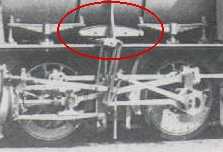Equalising beam
From Wikipedia, the free encyclopedia

Equalising beam on a Prussian T 3
An equalising beam, equalising lever or equalising bar[1] (German: Ausgleichshebel or Ausgleichhebel) links the suspension of two or more adjacent axles of a vehicle with more than two axles, especially railway locomotives. Its job is to provide 'compensated' springing,[2] i.e. to ensure an even and statically determinate distribution of load to all the axles on uneven terrain or poorly laid track. The function of an equalising lever thus corresponds roughly to that of axle compensators or rockers (Achswippen).

Railcar bogie, with equalising beam
References
- ↑ Or "equalizing" beam,etc.
- ↑ Semmens, P.W.B. and Goldfinch A. J. (2003). How Steam Locomotives Really Work, Oxford and New York, OUP, pp. 242-243. ISBN 978-0-19-860782-3.
| |||||||||||
This article is issued from Wikipedia. The text is available under the Creative Commons Attribution/Share Alike; additional terms may apply for the media files.